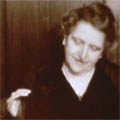|
|
|
Anna, 30, and Laura, 17, arrived in New York City in 1905. Their sister Eugenia and her family joined them soon thereafter, and by 1907, they all moved to Providence, where Frank and other Tirocchis were living. The economic prosperity in the city at that time would have assured Anna that this was a place where she could build a profitable business.
Four years later, Anna was able to begin realizing her true dream by purchasing the large, distinguished Victorian house with a fashionable address at 514 Broadway. Laura had recently married Dr. Louis Cella, and they all moved into 514 Broadway, making it their "business home." The women moved their dressmaking business there, and eventually, Dr. Cella set up his medical practice there, too.
Although of average immigrant background, Anna lived an upper class life in Providence. It seems she rarely socialized, and then only with other Italians of similar class, such as the Vervena family whose head was Italian Consul to Providence and president of Columbus Exchange Bank. Devoted to family and employees, Anna Tirocchi never married. She considered the women who worked for her and her nieces and nephews to be her "children," making wedding gowns for her "girls," and taking a number of nieces and nephews into the Broadway house for periods of time, paying for their schooling at neighboring St. Mary’s parish school. She also supported their education and encouraged them in their professional aspirations. Anna’s business was a calling to her. She skillfully managed immigration and a new start; engineered the transition of her business as the retail trade intruded into her custom dressmaking sphere; and maintained enough business and investment income to support herself as a single woman and help those around her.
^back to
top
|
|
The STORIES
|
|
|
|
for more information about the Tirocchi's immigration,
see the immigration
pages. |


